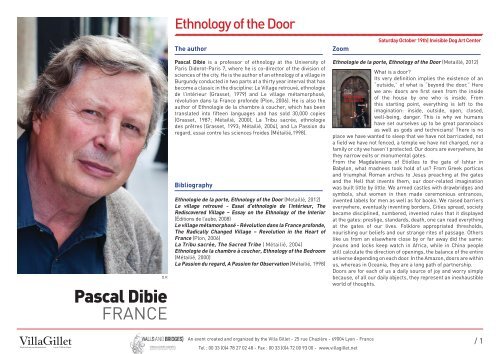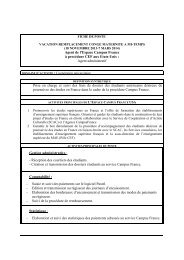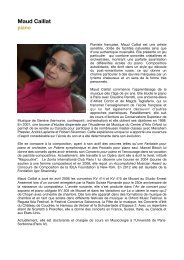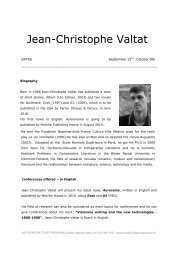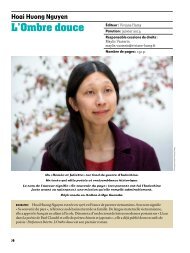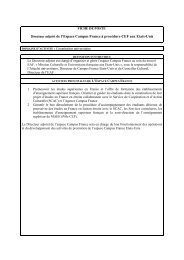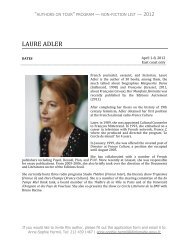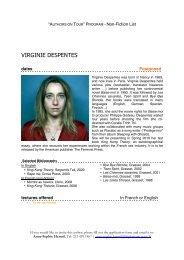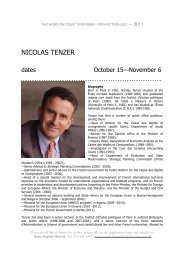Download Pascal Dibie's complete biography - Villa Gillet
Download Pascal Dibie's complete biography - Villa Gillet
Download Pascal Dibie's complete biography - Villa Gillet
Create successful ePaper yourself
Turn your PDF publications into a flip-book with our unique Google optimized e-Paper software.
Ethnology of the Door<br />
The author<br />
Zoom<br />
Saturday October 19th| Invisible Dog Art Center<br />
D.R<br />
<strong>Pascal</strong> Dibie<br />
FRANCE<br />
<strong>Pascal</strong> Dibie is a professor of ethnology at the University of<br />
Paris Diderot-Paris 7, where he is co-director of the division of<br />
sciences of the city. He is the author of an ethnology of a village in<br />
Burgundy conducted in two parts at a thirty year interval that has<br />
become a classic in the discipline: Le <strong>Villa</strong>ge retrouvé, ethnologie<br />
de l’intérieur (Grasset, 1979) and Le village métamorphosé,<br />
révolution dans la France profonde (Plon, 2006). He is also the<br />
author of Ethnologie de la chambre à coucher, which has been<br />
translated into fifteen languages and has sold 30,000 copies<br />
(Grasset, 1987; Métailié, 2000), La Tribu sacrée, ethnologie<br />
des prêtres (Grasset, 1993; Métailié, 2004), and La Passion du<br />
regard, essai contre les sciences froides (Métailié,1998).<br />
Bibliography<br />
Ethnologie de la porte, Ethnology of the Door (Metaillé, 2012)<br />
Le village retrouvé - Essai d’ethnologie de l’intérieur, The<br />
Rediscovered <strong>Villa</strong>ge – Essay on the Ethnology of the Interior<br />
(Éditions de l’aube, 2008)<br />
Le village métamorphosé - Révolution dans la France profonde,<br />
The Radically Changed <strong>Villa</strong>ge – Revolution in the Heart of<br />
France (Plon, 2006)<br />
La Tribu sacrée, The Sacred Tribe ( Métailié, 2004)<br />
Ethnologie de la chambre à coucher, Ethnology of the Bedroom<br />
(Métailié, 2000)<br />
La Passion du regard, A Passion for Observation (Métailié, 1998)<br />
Ethnologie de la porte, Ethnology of the Door (Metaillé, 2012)<br />
What is a door?<br />
Its very definition implies the existence of an<br />
“outside,” of what is “beyond the door.” Here<br />
we are: doors are first seen from the inside<br />
of the house by one who is inside. From<br />
this starting point, everything is left to the<br />
imagination: inside, outside, open, closed,<br />
well-being, danger. This is why we humans<br />
have set ourselves up to be great paranoiacs<br />
as well as gods and technicians! There is no<br />
place we have wanted to sleep that we have not barricaded, not<br />
a field we have not fenced, a temple we have not charged, nor a<br />
family or city we haven’t protected. Our doors are everywhere, be<br />
they narrow exits or monumental gates.<br />
From the Magdalenians of Etiolles to the gate of Ishtar in<br />
Babylon, what madness took hold of us? From Greek porticos<br />
and triumphal Roman arches to Jesus preaching at the gates<br />
and the Hell that invents them, our door-related imagination<br />
was built little by little. We armed castles with drawbridges and<br />
symbols, shut women in then made ceremonious entrances,<br />
invented labels for men as well as for books. We raised barriers<br />
everywhere, eventually inventing borders, Cities spread, society<br />
became disciplined, numbered, invented rules that it displayed<br />
at the gates: prestige, standards, death, one can read everything<br />
at the gates of our lives. Folklore appropriated thresholds,<br />
nourishing our beliefs and our strange rites of passage. Others<br />
like us from an elsewhere close by or far away did the same:<br />
jnouns and locks keep watch in Africa, while in China people<br />
still calculate the direction of openings, the balance of the entire<br />
universe depending on each door. In the Amazon, doors are within<br />
us, whereas in Oceania, they are a long path of partnership.<br />
Doors are for each of us a daily source of joy and worry simply<br />
because, of all our daily objects, they represent an inexhaustible<br />
world of thoughts.<br />
An event created and organized by the <strong>Villa</strong> <strong>Gillet</strong> - 25 rue Chazière - 69004 Lyon - France<br />
Tel : 00 33 (0)4 78 27 02 48 - Fax : 00 33 (0)4 72 00 93 00 - www.villagillet.net<br />
/ 1
Le village retrouvé - Essai d’ethnologie de<br />
l’intérieur, The Rediscovered <strong>Villa</strong>ge – Essay on<br />
the Ethnology of the Interior (Éditions de l’aube,<br />
2008)<br />
urban sprawl.<br />
Going back on the sacrosanct<br />
ethnological principle of<br />
“distance,” <strong>Pascal</strong> Dibie makes<br />
his own village a site for study.<br />
Through his experience of<br />
rural life and his travels in<br />
the Americas, he offers us<br />
an empirical, documented<br />
analysis of the 1980s rural<br />
environment in the face of<br />
Le village métamorphosé - Révolution dans<br />
la France profonde, The Radically Changed<br />
<strong>Villa</strong>ge – Revolution in the Heart of France<br />
(Plon, 2006)<br />
“We got on the high-speed<br />
train of modernity without<br />
really noticing, and when<br />
we look out the window, the<br />
landscape goes by so fast we<br />
can’t read it or even remember<br />
what we’ve see. I have the<br />
impression we’ve become<br />
specialists of the forgotten.”<br />
Twenty-seven years after Le<br />
<strong>Villa</strong>ge Retrouvé (1979) was first published,<br />
ethnologist <strong>Pascal</strong> Dibie has published Le village<br />
métamorphosé—a new set of universally valid<br />
observations made from Chichery, in Burgundy,<br />
where he has lived since childhood. He takes us<br />
on a mind-blowing trip deep into the heart of<br />
our emerging rurbanity, observing society as it<br />
goes through one of the greatest mutations in<br />
its thousand-year history. Focusing on our most<br />
humble activities and the banality that records<br />
our days on the long calendar of history, the<br />
author describes a quotidian in which the<br />
world of signs and landscape architects is<br />
king; cars, cybernetics and consumption are<br />
the mistresses of our minds, our time and<br />
our economy; religion has become so abstract<br />
that funeral rites have been changed and we<br />
are allowed to exclude our dead; agriculture<br />
has become outrageously “scientific” and our<br />
landscapes are being catalogued as elements<br />
of our heritage, etc. An ancient society is dying<br />
as individuals express their egotism and the<br />
peasant or farmer (paysan), a person in a rural<br />
locality (pays), has become a highly trained, decultured<br />
technician who has been able to find<br />
a niche in the mist of the globalization that is<br />
overtaking and devouring him. This ethnology,<br />
disguised as a story in which naked thoughts<br />
cross paths with field notes, portraits of<br />
masters, and deep reflection, places Le village<br />
métamorphosé among the greatest works of<br />
Human Earth.<br />
La Tribu sacrée, The Sacred Tribe ( Métailié,<br />
2004)<br />
Through an ethnology of<br />
proximity, a sort of voyage<br />
within the “tribe of the soul<br />
raisers,” that is, diocesan<br />
priests, <strong>Pascal</strong> Dibie clears<br />
up many mysteries.<br />
The exemplary day of a rural<br />
parish priest, the ingrained<br />
and authorized gestures<br />
the priest makes from the<br />
moment he gets up to the moment he goes to<br />
bed, the question of donations at the root of<br />
Christianity, the “invention” of mass, liturgical<br />
vestments, communion wafers, the monstrance<br />
or tabernacle, and the techniques for discerning<br />
the vocation or the announced disappearance<br />
of parish priests: from his resolutely rationalist<br />
perspective, the ethnologist observes and<br />
describes in minute, attentive detail, the<br />
Christian culture that constituted us and<br />
continues to surround us everywhere in France.<br />
Ethnologie de la chambre à coucher, Ethnology<br />
of the Bedroom (Métailié, 2000)<br />
The great adventure of<br />
human rest is presented<br />
here, not without humor,<br />
as an odyssey on a ship<br />
christened “mattress.”<br />
The author depicts Roman<br />
emperors theorizing in<br />
bed, rehabilitates the rois<br />
fainéants (the do-nothing<br />
or lazy kings), surprises the<br />
Church in the middle of the bed and relates<br />
the invention of the couple’s bedroom. He<br />
takes us into Amazonian room-villages and<br />
children’s dormitories in India, hops from beds<br />
of romance to beds of suffering, springs from<br />
there onto a Chinese emperor’s throne after<br />
having, in the meantime, taken a little nap on an<br />
ice floe, chased away drafts, braved parasites,<br />
and visited our cellars and attacks to end up<br />
in Japan in a fold-away room. <strong>Pascal</strong> Dibie<br />
tells us everything we ever wanted to know<br />
about bedrooms and holds up a mirror so we<br />
can finally do the impossible: watch ourselves<br />
sleep.<br />
An event created and organized by the <strong>Villa</strong> <strong>Gillet</strong> - 25 rue Chazière - 69004 Lyon - France<br />
Tel : 00 33 (0)4 78 27 02 48 - Fax : 00 33 (0)4 72 00 93 00 - www.villagillet.net<br />
/ 2 / 2
La Passion du regard, A Passion for<br />
Observation (Métailié, 1998)<br />
A fascinating book that<br />
reminds us that practicing<br />
ethnology means accepting<br />
not only one’s own gaze,<br />
but that of others, and that<br />
this discipline does not<br />
tolerate half-heartedness,<br />
for the science changes as<br />
it fuses with its subject(s). It<br />
describes an ethnology that<br />
is being rebuilt on new foundations so solid they<br />
escape the retro fashions and vague currents of<br />
the day.<br />
An event created and organized by the <strong>Villa</strong> <strong>Gillet</strong> - 25 rue Chazière - 69004 Lyon - France<br />
Tel : 00 33 (0)4 78 27 02 48 - Fax : 00 33 (0)4 72 00 93 00 - www.villagillet.net<br />
/ 3 / 3


